
The Ultimate Commercialisation of Crisis Thinking: Letting Them Play the (White) Saviours
Crisis thinking
in the media is very common when it comes to Africa. This type of reporting prioritises urgency over a considered response and can have negative consequences. Assuming a crisis leads to deepening of a problem, rather than finding a solution.
Crisis thinking adds to and upholds the narrative of Africa as a helpless continent in constant crisis. There are various themes that can be identified after analysing this crisis thinking. These are as follows:
- Africa cannot solve their crises by themselves, without intervention the continent will remain a chaotic mess. (white people need to save the world)
- There is a sense of urgency and an emphasis on need. Something needs to change. The undertone of this theme is always a hopeless one, something should change, but evidentially it is not going to, as is seen through these recurring crises.
- A dichotomy between ‘us’ and ‘them’. Where ‘us’ here in the West are safe, know better, and condescendingly look down on a continent that cannot seem to pull itself together. In this narrative, we are fundamentally different, have nothing to do with the crises, and are bystanders to it all.
Crisis thinking is part of a larger hegemonic structure of global relations, where the West holds power over other countries and is in a position to exploit them for their own benefit. It is a remnant of colonial times and is upheld by many factors.
One large factor upholding this structure is continuously fed by crisis thinking. It is the White Saviourism complex, the notion that people from the West are superior to others and they have the moral obligation to ‘help’ those less fortunate or gifted than them. The narrative painted by crises thinking flawlessly feeds into this (often subconscious) stream of thought, it provides the feeling that the world needs to be saved, and they are the ones most qualified to do it. This then becomes a commodity for companies to capitalise off.
Growing up in a privileged world where this narrative of Africa is spoon-fed, many people do not actively realise it, but they subconsciously believe this narrative of Africa to be true, and subconsciously hold onto the white saviourism complex, because this is what they have been taught by the world around them. They want to help and something to better the situation, as they feel qualified to, simply because we in the West know better (see point 2), Africans can obviously not solve their issues themselves (point 1), and they are in need of external help (point 3).
One way companies capitalise off this narrative and assumption of white saviourism is through voluntourism. Voluntourism is a term combining the concepts of volunteering and tourism. It has been defined as “holiday-makers who volunteer to fund and work on social or conservation projects around the world”, and concerns mostly young people from rich Northern hemisphere countries providing aid such as childcare and environmental projects to Southern hemisphere countries.[1]
This post will investigate this commercialisation of crisis thinking, taking as example voluntourism. Through discourse analysis of websites advertising voluntourism, as well as newspapers and other media, it will be shown that the three themes identified earlier are used by these companies to generate revenue and continue to uphold a hegemonic global power structure. Two companies will be analysed: Projects Abroad (PA) and Global Crossroad (GCR).
Crisis thinking in the media
This summer, I interned at a newspaper, Het Financieele Dagblad, and I had a few of them laying around the house. I decided to analyse their articles on events in Africa, in order to identify crisis thinking, and the three themes outlined above. To make it more clear, I highlighted quotes from the articles in colours that can be linked to the three themes: 1) Africa needs outside help. 2) a sense of urgency and need. 3) ‘us’ and ‘them’.
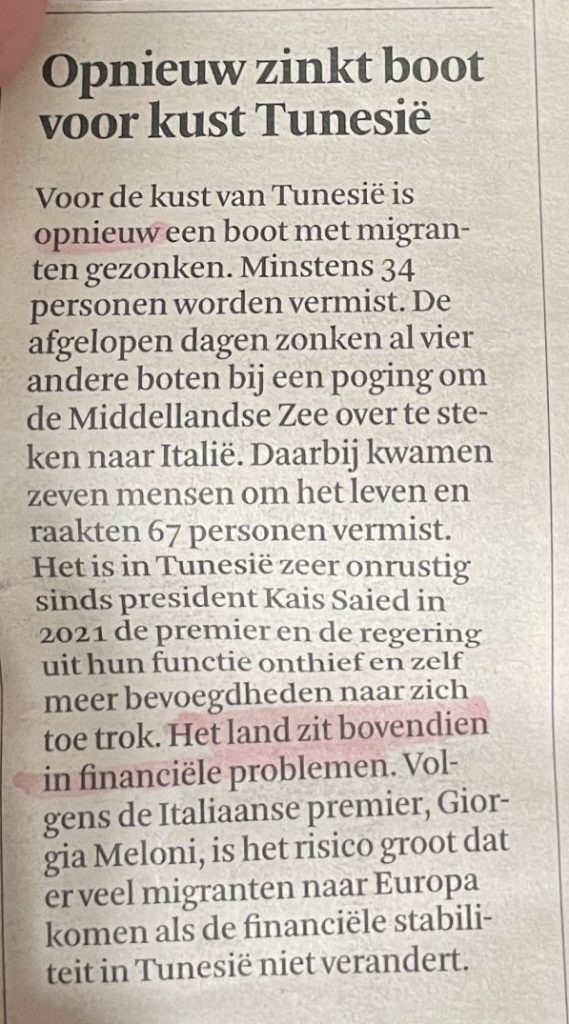
“Once again boat sinks Tunesian coast” The use of ‘again’ in the text implies the continuous state of crisis the country is in. Later, the article states that ‘Moreover, the country is knee deep in financial problems’ once again emphasising the multitude of problems in the country.
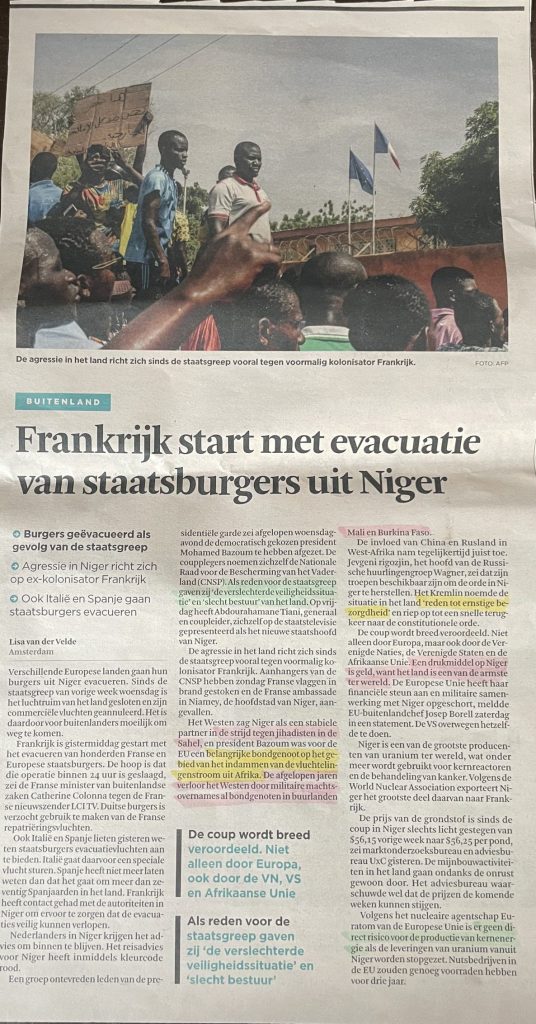
quotes from: “France starts Evacuating Citizens from Niger” ‘…saw Niger as important ally in fighting jihadists in the Sahel’ – implying that it is their project and responsibility, instead of African countries’ ‘clause for serious concern’ – implying their responsibility and the urgency
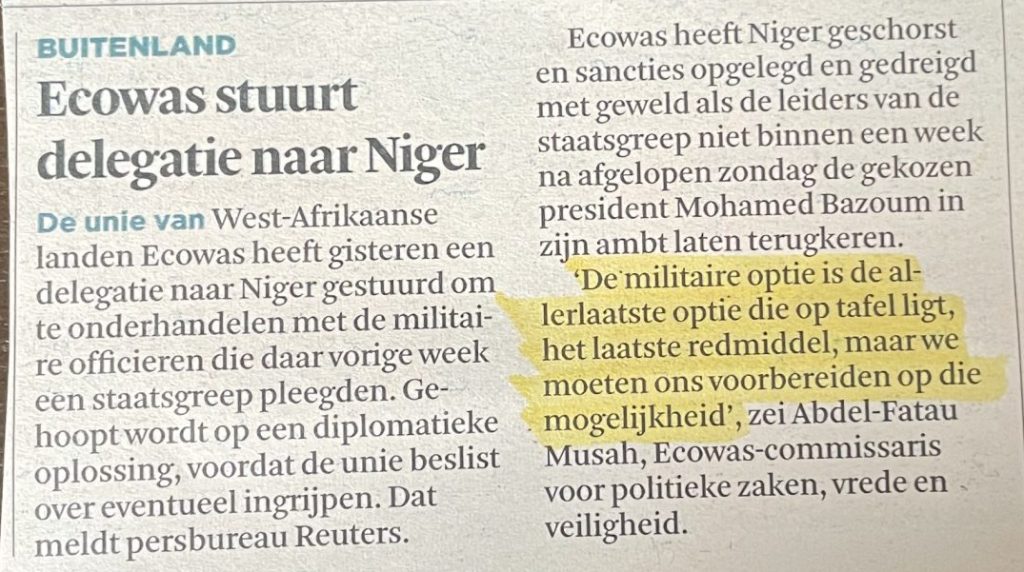
Quote from “Ecowas sends delegation to Niger” ‘the military option is the last option on the table, the last remedy, but we need to prepare for that possibility’ – playing into the narrative of desperation and urgency.
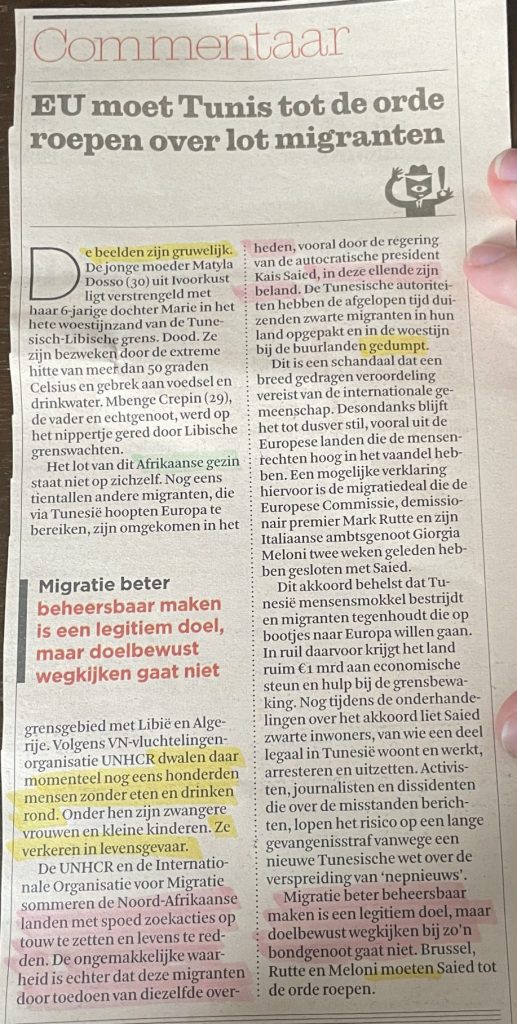
Quotes from: “EU needs to call Tunis to order about fate of migrants” ‘…[international organisations] command the North African countries to urgently create searches and save lives. The uncomfortable truth is, however, that these migrants ended up in this mess because of those same governments” – playing into the narrative of incapable governments, urgency, and the need for international organisations to intervene. ‘…actively looking away does not help’ – africans need the help of the EU
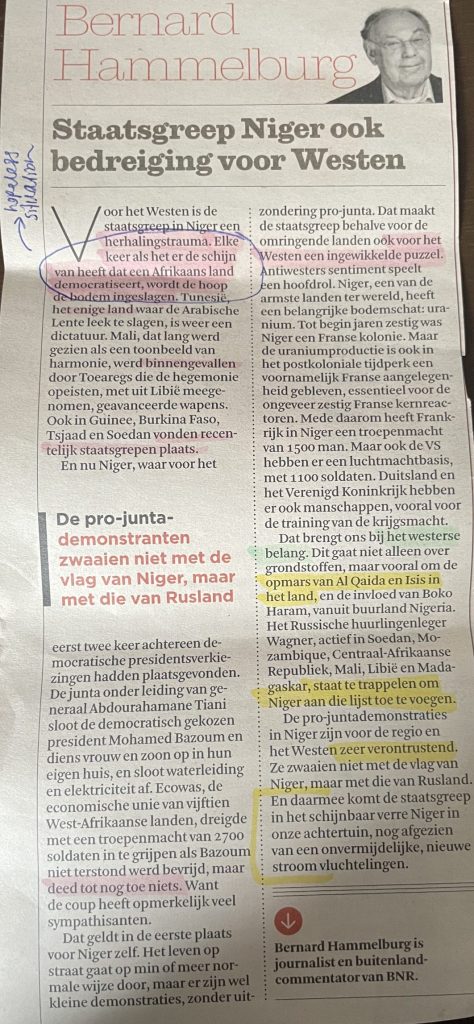
quotes from: “Coup Niger also Threat to West” ‘[the coup] is a recurring trauma. Every time it seems that an African country is democratising, that hope gets shut down’ – continuing the narrative of incompetent Africa. ‘Advance of Al Qaida and Isis in the country… very concerning’ – implying urgency and need.
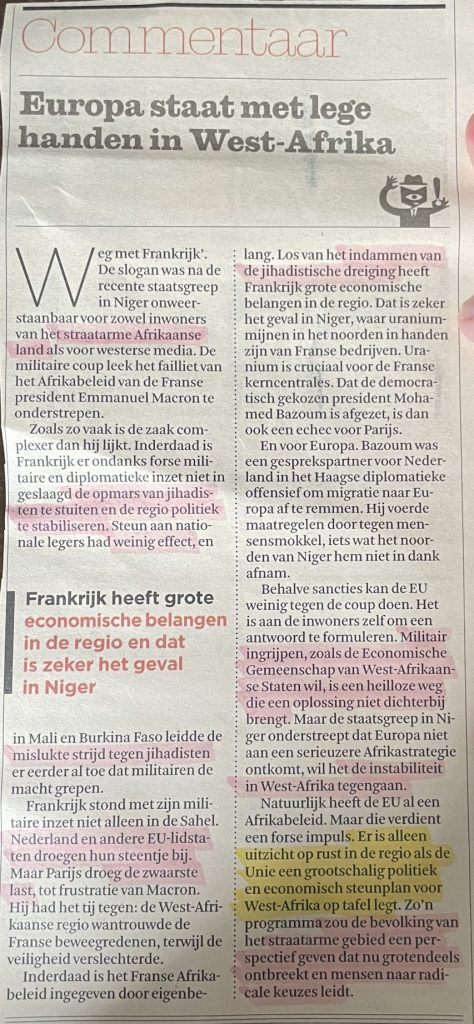
Some highlighted quotes from the piece: “Europe Empty-Handed in West Africa” ‘…for the dirt poor African country’ – playing into helpless stereotypes of African countries. ‘to stop the advance of jihadists and stabilise the region politically’ (speaking of Europe’s aims in the region) – the assumption that the West needs to ‘fix’ the region. ‘…had little effect … failed fight against jihadist’ – naming efforts by African countries to ‘solve their own problems’ ‘The Netherlands and other EU member states all did their part, but France carried the worst burden’ – implying it is their duty to fix Africans issues, even if it is not easy, they will do it. ‘there will only be rest in the region if the Union (European) provides a large political and economic plan of support for West Africa’ – …because they obviously cannot solve their issues themselves. ‘The West saw Niger as a partner in fighting Jihadists in the Sahel’ – implying that it is their mission, not that of the African countries ‘…reason for serious concern’ – emphasising the urgency and need of the region. ‘a tool of pressure for the country is money, because it is one of the poorest countries in the world’ – framing African countries in a state of financial crisis
Voluntourism websites
The following part of this post will be discourse analysis from the voluntourism agency’s. Once again, I highlighted the quotes in corresponding colours to the themes of crisis thinking identified earlier in the text.
On GCR’s ‘Our Achievements’ page they declare how much of the voluntourists’ “much needed and appreciated time” they spent “making this world a better place.”[2]
This type of language paints a picture of the volunteers as much needed saviours. By emphasizing how the voluntourists’ time is much-needed, GCR confirms the notion that unexperienced young adults are crucial in development and local communities cannot do it alone, creating a narrative of superiority and saviourism.[3]
Although the volunteers are not required to have any qualification of skill, GCR promises that the voluntourist is still able to provide aid, stating
“Global Crossroad’s volunteers offer unconditional love, altruistic compassion, and much-needed support for orphans, at-risk children, women’s support groups, and impoverished communities”,
alluding to the idea that the voluntourists’ love and compassion makes them qualified enough to provide aid, and solve the ever-lasting crisis of the African continent.[4]
Just as with GCR, previous experience for joining PAs project is not needed, only a willingness to help and a minimum age of 16.[5] Reaffirming idea that anyone, even someone as young as sixteen, can provide aid to communities in South Africa, alluding to white saviourism and superiority.
The page of a specific GCR project tells the story of how many South African children have turned into helpless orphans, and are in “desperate need of volunteers like you”, furthering the narrative of the voluntourist as saviour and creating an image of the South African child as helpless and needy.[6] Language that alludes to the superiority of the voluntourist in combination with the narrative of the destitute host communities confirms the dichotomy of ‘us’ and ‘them’ supported by the media, which alludes to the superiority of the Global North and, in combination with the centring of the voluntourist, confirms the element of the white saviourism present within GCR.[7] Phrases such as “the immeasurable value of our volunteers’ contributions will be realized for years to come” play into the necessity of the ‘help’ of the volunteers. It implies that just by being an outsider, their help will make a huge difference, something that Africans on the ground could never do.
when explaining the facilities available to the voluntourist, GCR explains that they should be “ready for comfort, as the home offers modern facilities including fans and running water and western style toilets.”[8] This shows the assumption that western culture is superior and South Africa should progress towards those notions of comfort, confirming the cultural imperialist notion of voluntourism. It also plays into the assumption that African countries would not normally have these facilities, and are fundamentally different from Western countries, in ways that are not favourable.
Both GCR and PA commit to the narrative that the volunteers can play the role of saviour in a crisis ridden Africa where the local communities are described as destitute, contributing to the theme of superiority and saviourism. Their use of language markets on the desire of voluntourists who want to act on their white saviourism assumptions and the narrative that has been created through crisis thinking. The companies create a narrative of simplistic effective development, which is rarely backed up with concrete evidence of impact. Both companies use language alluding to communities in need of the aid voluntourists are able to provide, even though neither ask for specific requirements except for age, they employ the narrative that “the world is nothing but a problem to be solved by enthusiasm.”[9] PA and GCR are both commercial enterprises that makes money from organising voluntourism projects, whether they are transparent about it or not. This shows how these companies profit of off the narrative that has been created by crisis thinking. The global structure of power in which voluntourism is situated promotes and sustains relations of dominance between the Global North and Africa. Voluntourism thrives in this environment due to the notion of superiority that underlies this structure. By upholding those structures under the veil of aiding development, voluntourism feeds and is fed by the narrative of crisis thinking and contributes to economic dependency and exploitation. Although the structure they are a part of is damaging, it is important to note that this does not imply vicious intent on behalf of the participants, as John Berger wrote, “a singer may be innocent; never the song”.[10]
Voluntourism in Social Media
Considering the current digital age of our society, anyone is able to contribute to the media landscape. By examining social media around voluntourism, it can be investigated whether the narrative employed by crisis thinking is continued here. Looking at three videos from the platform ‘TikTok’, this blog will look at the contribution of this kind of media to the crisis thinking narrative.
‘people help the people’ is not only a catchy song lyrics, the creator of the video implies that the people in the video not only need help, but that others have the obligation to help them. By showing her activities, she is taking the moral highground. This feeds into the narrative of Africans as people that need to be helped.
By reiterating that people told her beforehand that Africa is dangerous, she contributes to a one-sided perspective of a dangerous continent in crisis. Instead of disagreeing, the implies that she is brave enough to still travel there, even though it is dangerous, so that she can provide the help she believes is needed.
The statement that she is ‘changing their lives’ implies that she has the ability to make a big impact on these specific children’s lives. This not only implies that they need help, but also that she, as a westerner, can help them better than they can help themselves.
These videos show how voluntourism is created by, but also creates more crisis thinking. By posting the texts used in the videos, the narrative of a helpless, incompetent, continent in constant crisis is continued.
Conclusion
This analysis of discourse surrounding Africa in a newspaper (Het Financieele Dagblad), voluntourism websites (Projects Abroad and Global Crossroads), as well as social media (TikTok) videos about voluntourism experience, has shown how the narrative of crisis thinking feeds into a larger structure of hegemonic power relations, creating a vicious cycle of confirming the same skewed narrative, in which the continuation of the White Saviourism complex is an important factor.
Sources used
- [1] Stephen Wearing, ‘Examining Best Practice in Volunteer Tourism’, in Volunteering as Leisure/Leisure as Volunteering: An International Assessment (CABI, 2004), 209–24 ; Ranjan Bandyopadhyay, ‘Volunteer Tourism and “The White Man’s Burden”: Globalization of Suffering, White Savior Complex, Religion and Modernity’, Journal of Sustainable Tourism 27, no. 3 (4 March 2019): 327–43, https://doi.org/10.1080/09669582.2019.1578361.
- [2] Global Crossroad, ‘Our Achievements’, www.globalcrossroad.com, n.d., https://www.globalcrossroad.com/gcr_achievements.php, accessed on Jun. 15, 2022.
- [3] Simpson, ‘“Doing Development”.
- [4] Global Crossroad, ‘Our Achievements’.
- [5] Ibid.
- [6] Global Crossroad, ‘Volunteer South Africa Underprivileged Children Program!’.
- [7] Simpson, ‘“Doing Development”.
- [8] Global Crossroad, ‘Volunteer South Africa Underprivileged Children Program!’.
- [9] Cole, ‘The White-Savior Industrial Complex’.
- [10] Ibid.
Leave a comment
You must be logged in to post a comment.